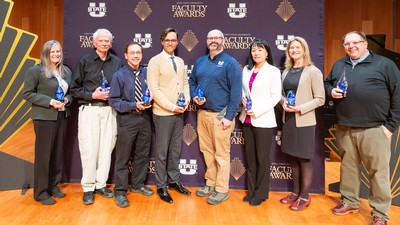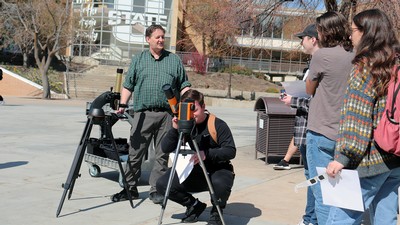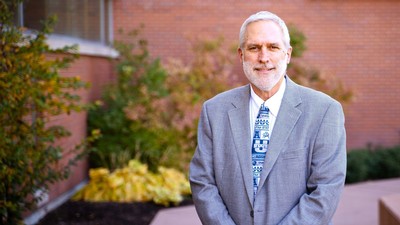Hamilton vs. Jefferson? Students to Debate Stark Contrasts in U.S. Politics
In a conference organized by political science associate professor Peter McNamara, students will take on the mindsets of Thomas Jefferson and Alexander Hamilton to analyze vital questions and differences in American democracy.
When it comes to political rivalries, few equal that between Thomas Jefferson and Alexander Hamilton.
Consider for instance this line flung by Hamilton at Jefferson: “Damn, you’re in worst shape than the national debt is in.”
Or this crowd-pleasing insult, also from Hamilton to Jefferson: “Hey, turn around, bend over, I’ll show you where my shoe fits.”
OK, those quotes are actually from the blockbuster Broadway musical “Hamilton.” But it’s thanks to this sensation that many millennials now look at Alexander Hamilton as a historical hero — rather than just the face on the $10 bill. Jefferson, well, not so much.
Their clashes defined from the very birth of our nation the two very different understandings of American power and the history of the American people.
Hamilton saw America’s strength as commerce. Jefferson, however, saw the nation’s backbones as the farmers and laborers on whose shoulders businesses built their success.
Utah State University’s first Hamilton vs. Jefferson debate on March 31-April 1 will allow students to explore those viewpoints from the inside out. Using the original writings of these two statesmen, participants will defend each position.
The colloquium will be kicked off with a public lecture by an expert on the Jefferson-Hamilton conflicts. James H. Read, an associate professor of political science at St. John’s University of Minnesota.
Read is the author of Power Versus Liberty: Madison, Hamilton, Wilson and Jefferson (University of Virginia Press). Moving away from national politics, Read also analyzes his grass-roots bid for a seat in the Minnesota state legislature in the 2008 Doorstep Democracy: Face-to-Face Politics in the Heartland (University of Minnesota Press).
Read speaks at 3:30 p.m. Friday, March 31, in room 006 of Old Main. The lecture is free and open to the public.
The seminar’s organizer, political science associate professor Peter McNamara, says the topics debated by Jefferson and Hamilton are as relevant today as in the years following their victory in the American Revolution. And maybe just as impolite: “They each gave as good as they got,” says McNamara. “They didn’t take anything lying down.”
Indeed, he adds, the lobby of Jefferson’s Monticello featured a bust of himself and another of Hamilton, simply glaring at each other.
McNamara says it’s a mistake to see the nation’s founding generation as being of one mind. They all had as their goal the fundamental principle of democracy. They just saw very different routes to achieving it.
Jefferson and Hamilton both understood the historical ramifications of their political combat, says McNamara. “You only get to start something once,” he said. “And they knew very quickly that they were in a real dog fight.”
Luckily for Americans of the 21st century, says McNamara, the dueling duo had the perfect referee in George Washington. Washington was able, said McNamara, to “reign them in and kind of keep them in check.”
The student debaters will take apart issues that are still with us — although, adds McNamara, today’s “battles lines” are a bit blurrier.
Among those debates: centralization versus decentralization; the financial sector versus the working classes; a strict versus looser interpretation of the U.S. Constitution.
“The partisan lines today are quite confused, but the underlying issues are still there,” he said.
The debates themselves will take place Saturday, April 1, in four sessions. McNamara believes that after offering up questions and defending opinions, the participating students will end up with increased “ownership” of their own political philosophies.
Often, said McNamara, people will define themselves as either a Hamiltonian or a Jeffersonian — much like philosophers are Platonists or Aristotelian's. “I can’t predict how things will turn out, and we have no set goals,” he said.
As for himself, he adds, “I could deny it, but I’m more of a Hamilton fan than a Jefferson fan.”
Jefferson did have the advantage, according to McNamara, of living 22 years beyond Hamilton’s death at the age of 47 in a 1804 duel. “And he made good use of it,” he adds.
After the debates have been exhausted, however, everything comes back to two tremendously charismatic, intelligent — and, yes, flawed — statesmen.
“These are two striking personalities who both have enormously attractive features. But they’re human, with deep flaws and blind spots,” said McNamara.
“You can learn something about human nature from that — what greatness is and what its limits are. Those are two things we can take from it.”
For more information, email peter.McNamara@usu.edu
Writer and contact: Janelle Hyatt, 435-797-0289, Janelle.Hyatt@usu.edu
Comments and questions regarding this article may be directed to the contact person listed on this page.






